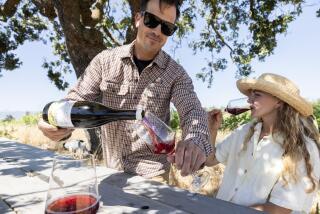Executive Uncorks Cosmopolitan Era for Tiny Winery
- Share via
Zaca Mesa Winery now shares office space with Cushman Realty in a Bunker Hill high-rise that is a three-hour drive south of its Santa Barbara County vineyards.
“We’re the only winery with headquarters 40 floors above the city,” quipped President Robert W. Schulz, who also heads Cushman Equities Corp., a management company for a variety of the business enterprises of John C. Cushman III.
The move south from Los Olivos in the Santa Ynez Valley, where vintage Chardonnay and Cabernet Sauvignon continue to be produced, marked completion of a change in the 15-year-old winery’s ownership begun three years ago when Cushman bought out the stake of founder Marshall Ream, a former Arco top executive.
For the winery’s first decade, Cushman, 46, remained a passive minority investor in Ream’s venture along with a dozen other investors. Cushman had been invited to participate in the venture by Ream, who he met while working at leasing the Arco Tower in downtown Los Angeles. Cushman Realty, which he founded with his twin brother Louis, also served as leasing agent for Crocker Center, which houses both the sprawling real estate venture and the far more modest Zaca Mesa headquarters.
Provided Deep Pocket
Under Ream, Zaca Mesa enjoyed several good years in the late 1970s, a star among the scores of “boutique” wineries begun in California in that decade.
But after 1980, Schulz said, the star came close to extinction--victim of an ill-timed expansion program that left Zaca Mesa heavily mortgaged as demand for wine plateaued and vineyard values plunged. “Looking backward, it’s clear that the company zigged when it should have zagged,” Schulz said.
Cushman provided the deep pocket that helped keep the winery afloat. He paid off a lot of debt, restructured other obligations and three years ago brought in Schulz, an investment banker whose clients included some wineries as well as Cushman, to guide the ailing venture. When the dust settled about 18 months ago, Cushman’s stake had increased to 52% and increased recently to 97%.
With Cushman’s support and Schulz’s leadership, Zaca Mesa recruited a new wine maker, Gale Sysock, a 32-year-old alumnus of the University of California’s wine department in Davis who was assistant wine maker at Conn Creek in the Napa Valley. The winery also hired Michael Leatherman, 41, from Vintage Wine Merchants, a San Francisco-based beverage firm that now distributes Zaca Mesa nationally.
Production has been cut back and quality improved in an effort to put the company back into the glorious orbit it enjoyed with its 1978 and 1979 vintages of Santa Barbara County Chardonnay and Cabernet Sauvignon, said the 40-year-old Schulz.
“Our market objective right now is to go back to basics and make Zaca Mesa one of the nationally known premium brands at the upper end of the price scale,” Schulz said. (The Cabernet now retails for about $8, the Chardonnay for around $9, with special bottlings priced at about $13, he said.)
‘Niche-Oriented Firm’
Because the company has yet to achieve profitability, Schulz said, the strategy is to improve margin without expanding production beyond the present 50,000 cases a year. About 60% of the grapes come from Zaca Mesa’s remaining vineyards, the rest bought elsewhere in northern Santa Barbara County (Santa Maria for Chardonnay, Paso Robles for Cabernet Sauvignon).
“We have the vineyards, winery, wine maker and financial resources to achieve our high goals,” Cushman said. He likened the decision to maintain the winery as a modest producer of premium wines to his own real estate ventures. “We are a niche-oriented firm,” he said. “We don’t seek to be the biggest but rather the best at what we do.”
Schulz said repositioning the winery requires taking a longer-term view than that taken in 1980.
“John is in this on a long-term basis,” he said, “and the decisions we’re making right now are long-term decisions. This is going to be a successful venture. We’ll do what it takes to make it that way.”
“Short-term decisions got Zaca Mesa in trouble,” Schulz said.
One of the longer-term decisions was to move accounting and marketing functions to Crocker Center atop Bunker Hill, leaving Sysock to produce the wine in Los Olivos, he added. “It didn’t make any sense to have a marketing director three hours from a national airport.” Nor, for that matter, the new owner and part-time president.
More to Read
Inside the business of entertainment
The Wide Shot brings you news, analysis and insights on everything from streaming wars to production — and what it all means for the future.
You may occasionally receive promotional content from the Los Angeles Times.










